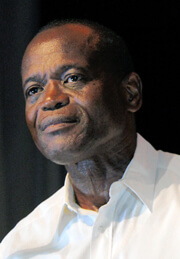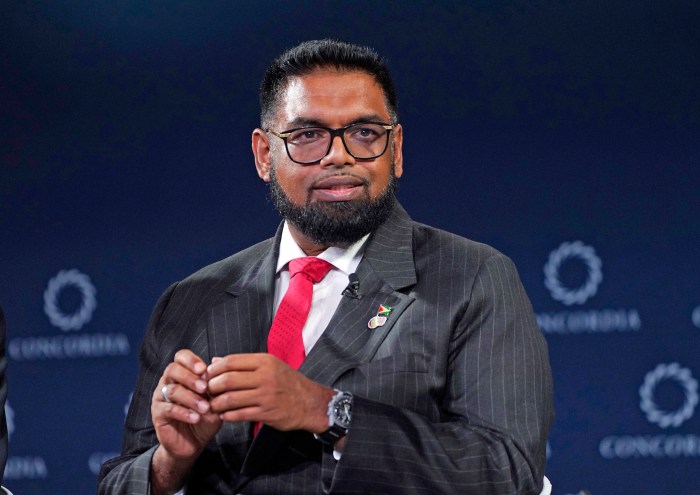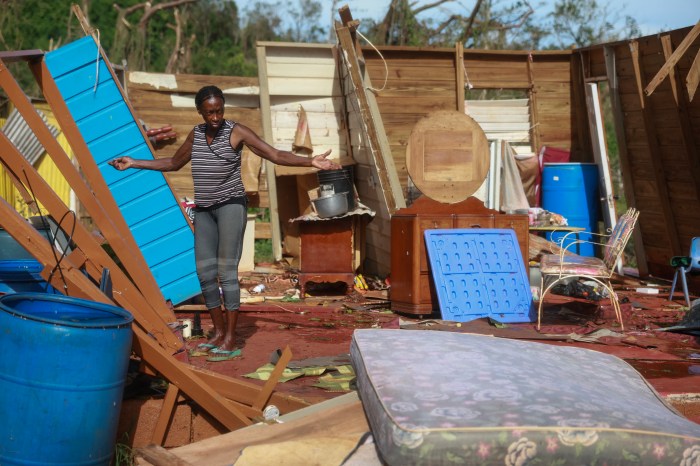Stating that it is time to change the country’s constitution in ensuring that it lives up to present day, Grenada says it is ready to join the Caribbean Court of Justice (CCJ) as its final court of appeal.
“We’re saying that it’s time for our own court to handle our destiny,” Attorney General and Minister of Legal Affairs, Elvin Nimrod, told a town hall meeting at Mahalia Jackson Intermediate School in Brooklyn on Sunday night, disclosing that the country’s Constitutional Reform Commission is expected to be “looking at the CCJ.”
“Some people say they’re afraid (about joining the CCJ),” added Nimrod, who is also deputy prime minister. He was flanked by Prime Minister Dr. Keith Mitchell, Health Minister Dr. Clarice Modeste, and government advisor and former Foreign Affairs and Tourism Minister Peter David.
“The (British) Privy Council is telling us that it’s time for us to have our own wings to fly,” continued Nimrod, who was part of a Grenada delegation visiting New York on the first leg of a three-city tour of North America. The delegation, led by Mitchell, is also expected to visit Toronto and Montreal.
“We have an obligation for our own country to have the CCJ determine our own destiny,” Nimrod said.
He said that the incumbent New National Party (NNP) also wants the proposed Constitutional Reform Commission to insert “the name of Carriacou and Petit Martinique on our national passport.
“We have Trinidad and Tobago, St. Vincent and the Grenadines, Antigua and Barbuda, Great Britain and Ireland, what is the reason why we can’t accept Grenada, Carriacou and Petit Martinique? Nimrod asked rhetorically.
Over the years, there has been intense debate in the region over allowing the CCJ as the final court of appeal.
The CCJ, which was established in 2001 in Port-of- Spain, Trinidad and Tobago, has two jurisdictions: An original jurisdiction and an appellate jurisdiction.
In its original jurisdiction, the CCJ is an international court with compulsory and exclusive jurisdiction in respect of interpretation and application of the revised Treaty of Chaguaramas.
In its appellate jurisdiction, the CCJ hears appeals as the final court – both in civil and criminal matters.
Member states, which have acceded to it as their final court, as of 2011, are Barbados, Belize and Guyana.
Almost 12 years after ratifying the agreement establishing the CCJ, the government of Prime Minister Dr. Kenny Anthony in St. Lucia said early last month that it will be joining the CCJ very soon.
“When St. Lucia joined the CCJ, we did not proceed to abolish appeals in civil and criminal matters to Her Majesty’s Privy Council,” said Governor General Dame Pearlette Louisy during the 2014 Throne Speech on May 6, 2014.
“My government believes that the time has now come to replace Her Majesty’s Privy Council by the Caribbean Court of Justice,” she added.
In January, Dominica said Britain had given its stamp of approval to adopt the CCJ as the island’s final court of appeal.
Prime Minister Roosevelt Skerrit disclosed that he received a letter from British Foreign Secretary William Hague indicating that the British Government agrees and has no objection to Dominica recognizing the CCJ as its final appellate court.
He said Section 42.4A of the Constitution of Dominica mandates the government to write to the British government, “seeking agreement before we move to delink from the Privy Council.
“If we had not gotten the agreement from the British government we would have to go through a referendum,” he said. “So the fact that we have gotten the agreement from them means, therefore, with a simple two-thirds majority, Dominica can recognize the Caribbean Court of Justice as its final court.”
Meanwhile, President of the CCJ, Sir Dennis Byron, wants the regional media to do more to bring governments and their people on board with the court, according to the Barbados Nation.
Byron said last month that, in the case of Jamaica, he was “appealing to the Fourth Estate” to assist the people “to do the inevitable, sooner rather than later.”
“Jamaica had passed legislation to abolish appeals to the Privy Council and have the Caribbean Court of Justice established as its final court of appeal, but somebody appealed to the Privy Council, who ruled that that legislation was unconstitutional,” Sir Dennis told a meeting of the Inter-American Press Association (IAPA) at Hilton Barbados, attended by several top media people from the Caribbean and Latin America.
“People who are talking about partiality [of courts] never said how could the Privy Council adjudicate on the rules which perpetuated itself as the final court of appeal,” he said, adding that there was a role for the regional media in encouraging people to speak up and to assist governments in making the correct decision with regard to being on board the CCJ.
Noting that all CARICOM countries had signed “an international binding obligation” to abolish appeals to the Privy Council, even though they did not set a time limit for implementation, Sir Dennis urged that CARICOM nations take the constitutional steps necessary to achieve this, according to the Nation.
He said while people can “sit back and criticize the politicians” about their decisions on the CCJ, the press and civil society had a role to play in reporting on CCJ-related matters and influencing people and governments, the Nation said.























